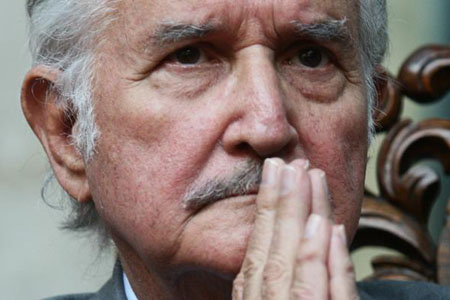“Carlos Fuentes, one of the most prolific and best known Spanish-language authors, has died,” reports Eyder Peralta for NPR. “His death was reported on Twitter by Mexican president Felipe Calderon.” Fuentes was 83. “In the United States, Fuentes is best known for his novel Gringo Viejo, or The Old Gringo, which was made into a film in 1989 starring Gregory Peck. Among his major literary awards was the Cervantes Prize in 1987.”
“His generation of writers, including Colombia’s Gabriel Garcia Marquez and Peru’s Mario Vargas Llosa, drew global readership and attention to Latin American culture during a period when strongmen ruled much of the region,” notes the AP. “The Death of Artemio Cruz, a novel about a post-revolutionary Mexico that failed to keep its promise of narrowing social gaps, brought Fuentes international notoriety. The elegant, mustachioed author’s other contemporary classics included Aura, Terra Nostra, and The Good Conscience…. Fuentes was often mentioned as a candidate for the Nobel prize but never won one. A busy man, Fuentes wrote plays and short stories and co-founded a literary magazine. He was also a columnist, political analyst, essayist and critic. And he was outspoken. Once considered a Communist and sympathizer of Cuba’s Fidel Castro, Fuentes was denied entry into the US under the McCarren-Walter Act. More recently, as a moderate leftist, Fuentes strongly opposed harsh policies against immigration and the war on terrorism in the US, though he expressed deep affection for the United States. He warned about Mexico’s religious right but also blasted Venezuela’s Hugo Chavez as a ‘Tropical Mussolini.'”
From Books and Writers: “Fuentes has been often paired with the Argentinian writer Jorge Luis Borges, the original master of magic realism, of whom he has also written: ‘… he seemed to be literally looking inside himself, as if this were the only thing that counted in matters of sight,’ Fuentes said in ‘Borges in Action,’ ‘seeing outside being a totally frivolous affair.’ When Borges uses history as a basis for pure fantasy, Fuentes maintains a realistic stance of power and politics in Latin America—magical elements, myths of the past and wide range of cultural references are combined with social critique.”
Update, 5/16: The always-excellent complete review refers us to further remembrances and indexes its reviews of and roundups on Fuentes’s work.
For news and tips throughout the day every day, follow @KeyframeDaily on Twitter and/or the RSS feed.




